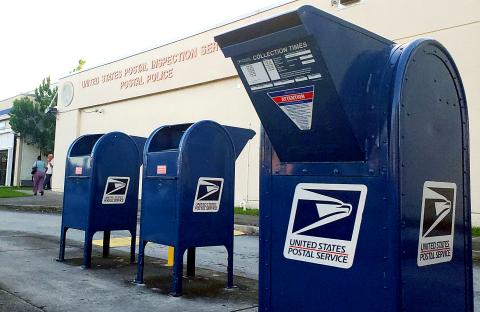US President Donald Trump’s trade adviser hailed a “big deal” approved as a compromise on Wednesday that will increase the fees the US Postal Service (USPS) collects from some foreign counterparts and keep the US from leaving the UN’s postal agency over what was largely a showdown with China.
Peter Navarro was dispatched from Washington with a US delegation to help reform the Universal Postal Union (UPU) at a time when e-commerce has vastly reshaped the postal business and private, non-postal operators like United Parcel Service Inc, FedEx Corp and others want to snare a larger market share.
The Trump administration had threatened to leave the 192-member group that the US helped create in 1874.

Photo: Reuters
UPU Director-General Bishar Hussein of Kenya said a US walkout would “completely shut down” the traditional system of shipping some types of mail.
The extraordinary congress, called this week to respond to the US threat, was only the third for a 145-year-old group that calls itself the second-oldest multilateral organization.
UPU members exchanged hugs, handshakes and high-fives after voting by acclamation in favor of the compromise.
The deal, which is to be phased in over the coming years, will allow countries to choose, or “self-declare,” the rates their postal operators can recoup from foreign partners.
“It’s a big deal for a couple of reasons: One is the US got immediate self-declared rates that saves us a half-a-billion dollars. It eliminates market distortions. It creates tens of thousands of jobs for America. It also helps our friends and allies in other nations,” said Navarro, insisting countries such as Brazil, Norway and Finland were “getting hammered” under the current system.
The US is to fast-track to “immediate self-declared rates” as of the end of June next year, which is the fastest technically possible, Navarro said.
The Trump administration had sought to end a decades-old practice by which the US in essence subsidizes postal operators from developing countries, insisting that China in particular has been benefiting unfairly.
Its complaint centered on the reimbursement that the USPS receives for providing final deliveries of “bulky letters and small parcels” sent from abroad — usually ones not weighing more than 2kg. Such mail can include high-value items like cellphones, memory sticks or pharmaceuticals.
The issue centers on the “last leg” of shipments, once the bulky letters and small parcels leave their country of origin — where the postage is paid —_ and enter a destination country. That requires postal services in the destination countries to incur costs that they later have to scratch back from the originating country.
Navarro claimed a victory for both the US and the UPU overall — and China joined 34 countries that helped drive through the final accord.
He said the accord would include payouts of US$40 million over five years, a sum more than offset by “anywhere from 300 million to 500 million dollars in savings and subsidies” elsewhere.
Under the accord, member countries that meet certain requirements — such as that letter and postal volumes exceeded 75,000 tonnes based on 2018 data — can self-declare their rates starting on July 1 next year.
Smaller, lower-volume countries get “thresholds” to protect them from the impact of “swift reform,” the UPU said in a statement.

Power supply and electronic components maker Delta Electronics Inc (台達電) yesterday said second-quarter revenue is expected to surpass the first quarter, which rose 30 percent year-on-year to NT$118.92 billion (US$3.71 billion). Revenue this quarter is likely to grow, as US clients have front-loaded orders ahead of US President Donald Trump’s planned tariffs on Taiwanese goods, Delta chairman Ping Cheng (鄭平) said at an earnings conference in Taipei, referring to the 90-day pause in tariff implementation Trump announced on April 9. While situations in the third and fourth quarters remain unclear, “We will not halt our long-term deployments and do not plan to

‘SHORT TERM’: The local currency would likely remain strong in the near term, driven by anticipated US trade pressure, capital inflows and expectations of a US Fed rate cut The US dollar is expected to fall below NT$30 in the near term, as traders anticipate increased pressure from Washington for Taiwan to allow the New Taiwan dollar to appreciate, Cathay United Bank (國泰世華銀行) chief economist Lin Chi-chao (林啟超) said. Following a sharp drop in the greenback against the NT dollar on Friday, Lin told the Central News Agency that the local currency is likely to remain strong in the short term, driven in part by market psychology surrounding anticipated US policy pressure. On Friday, the US dollar fell NT$0.953, or 3.07 percent, closing at NT$31.064 — its lowest level since Jan.

The US dollar was trading at NT$29.7 at 10am today on the Taipei Foreign Exchange, as the New Taiwan dollar gained NT$1.364 from the previous close last week. The NT dollar continued to rise today, after surging 3.07 percent on Friday. After opening at NT$30.91, the NT dollar gained more than NT$1 in just 15 minutes, briefly passing the NT$30 mark. Before the US Department of the Treasury's semi-annual currency report came out, expectations that the NT dollar would keep rising were already building. The NT dollar on Friday closed at NT$31.064, up by NT$0.953 — a 3.07 percent single-day gain. Today,

The New Taiwan dollar and Taiwanese stocks surged on signs that trade tensions between the world’s top two economies might start easing and as US tech earnings boosted the outlook of the nation’s semiconductor exports. The NT dollar strengthened as much as 3.8 percent versus the US dollar to 30.815, the biggest intraday gain since January 2011, closing at NT$31.064. The benchmark TAIEX jumped 2.73 percent to outperform the region’s equity gauges. Outlook for global trade improved after China said it is assessing possible trade talks with the US, providing a boost for the nation’s currency and shares. As the NT dollar